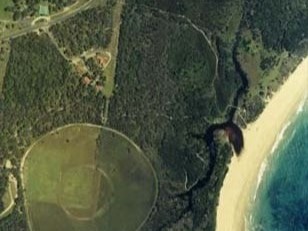Pipe Clay Creek is a small creek with an entrance which is intermittently closed/open to the sea. This estuary is situated near Corindi Beach on the north coast of New South Wales and is classed as a creek.
Pipe Clay Creek lies in traditional lands of the Gumbaynggirr people of Corindi and holds particular cultural significance for this community.
Water quality report card
As part of our water quality monitoring program we assess the water quality and ecosystem health of an estuary using a range of relevant indicators. We sample a subset of the estuaries located between the Queensland border and Taree every 3 years. The most recent sampling in Pipe Clay Creek was completed over the 2021–22 summer, when 2 sites were sampled on a monthly basis.
This report card represents 2 water quality indicators that we routinely measure: the amount of algae present and water clarity. Low levels of these 2 indicators equate with good water quality.
Algae
Water clarity
Overall grade
The report card shows the condition of the estuary was fair with:
- algae abundance graded poor (D)
- water clarity graded good (B)
- overall estuary health graded fair (C).
Grades for algae, water clarity and overall are represented as:
- A – excellent
- B – good
- C – fair
- D – poor
- E – very poor.
Go to estuary report cards to find out what each grade means, read our sampling, data analysis and reporting protocols, and find out how we calculate these grades.
We have monitored water quality in Pipe Clay Creek since 2012. This table shows the water quality grades for this estuary over that time.
| Year | Algae | Water clarity | Overall grade |
|---|---|---|---|
| 2009–10 | C | C | C |
| 2012–13 | A | B | B |
| 2015–16 | B | B | B |
Physical characteristics
| Estuary type | Creek |
|---|---|
| Latitude (ºS) | –30.02 |
| Longitude (ºE) | 151.21 |
| Catchment area (km2) | 1.6 |
| Estuary area (km2) | 0.01 |
| Estuary volume (ML) | 1.7 |
| Average depth (m) | 0.2 |
Notes: km2 = square kilometres; m = metres; ML = megalitres.
Water depth and survey data
Bathymetric and coastal topography data for this estuary are available in our data portal.
Land use
The catchment of Pipe Clay Lagoon has been highly disturbed. Although the immediate area around the estuary remains forested, the estuary receives urban runoff from Corindi and surrounding rural residential development, which have changed land use in the catchment.
National and marine parks
- Pipe Clay Creek forms part of the Solitary Islands Marine Park.
- Conimbla National Park is the largest conservation area in this catchment.
Community involvement
- Coffs Harbour Regional Landcare is an umbrella group for volunteers within the area, which includes Pipe Clay Creek.
- Yarrawarra bushwalk meanders around Pipe Clay Creek and through its catchment and is associated with Yarrawarra Aboriginal Cultural Centre.

Aerial view of Pipe Clay Creek estuary.
Local government management
Local councils manage estuaries within their area unless the estuary is attached to a marine park.
Pipe Clay Creek is managed by Coffs Harbour City Council and the NSW Department of Primary Industries and Regional Development as part of the Solitary Islands Marine Park.
More information about the management of this estuary is available on the council's Estuary management plans webpage.
Threatened species
Estuaries provide important protected environments where native plants like seagrass and mangroves grow and create habitat for fish and other animals.
Read more about the biodiversity in our estuaries.